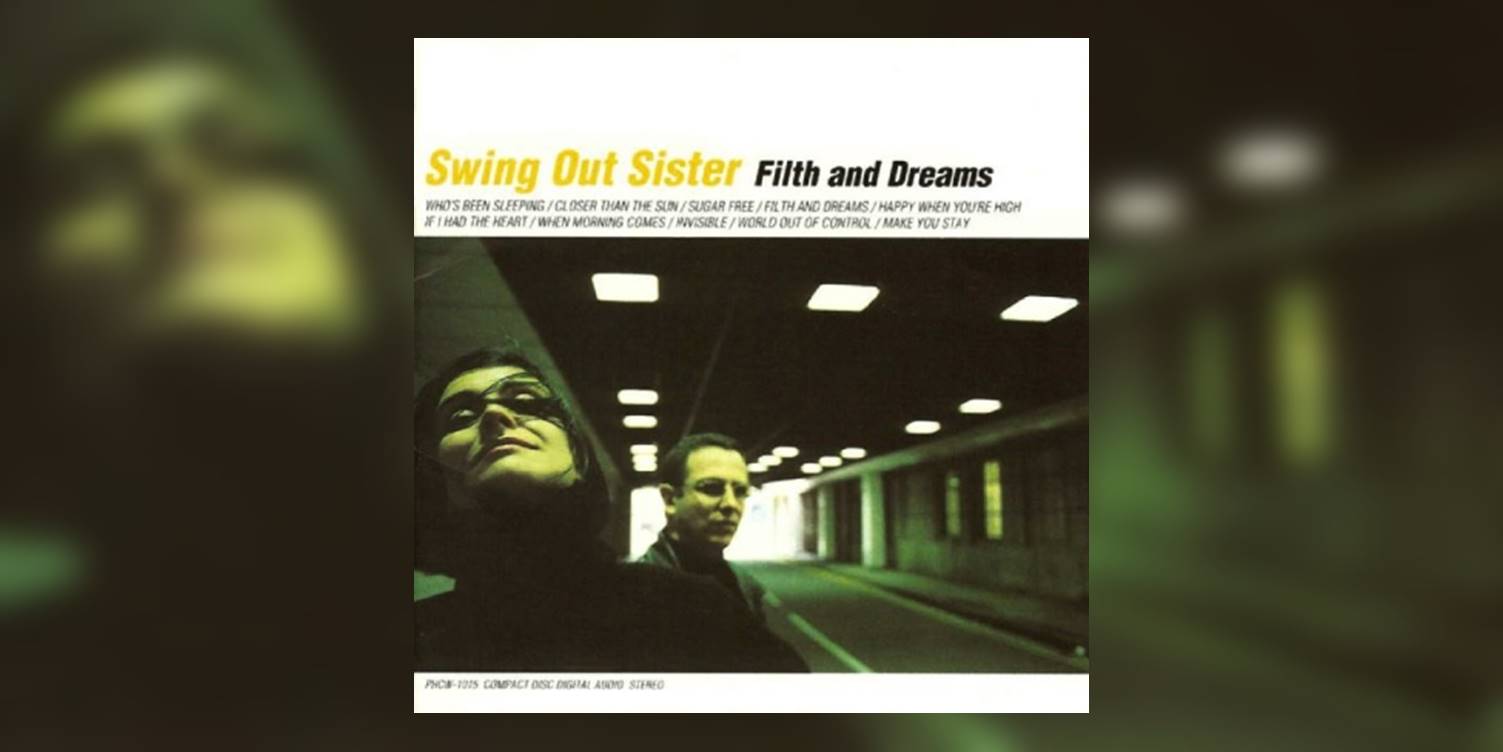Happy 20th Anniversary to Swing Out Sister’s sixth studio album Filth and Dreams, originally released March 17, 1999 in Japan only.
A little over a decade on from their debut offering It’s Better to Travel (1987), the British pop pair Swing Out Sister—Corinne Drewery (vocals) and Andy Connell (arranger/keyboards)—had shown that their career in music making was always intended for the long term.
Upon exiting the 1980s on a moderate commercial high, the duo entered the 1990s emboldened to further create a space all their own across four studio efforts—Kaleidoscope World (1989), Get in Touch with Yourself (1992), The Living Return (1994), and Shapes and Patterns (1997)—that reanimated their vintage musical influences that ranged from Dusty Springfield to Earth, Wind & Fire in a contemporary context. By 1999, this had made Drewery and Connell a singular presence in popular music. Yet, this pioneering spirit dealt Swing Out Sister intermittent commercial success and consigned their chart fortunes to certain parts of the globe. With the strong performance of Shapes and Patterns in Japan, it set the two on a new path to walk.
Deciding to forego any formal label contracts in either the United Kingdom or the United States—two famously “hot and cold” territories for them—Swing Out Sister initially opted to take the independent route. It was here that the seeds for their sixth studio outing Filth and Dreams were unconsciously sewn.
As Connell recalled in my interview with them last spring, “We’d been doing a little side project the year before, up in Manchester, just exploring some of the things that we never usually got a chance to do musically. Darker stuff, a little trip-hop and drum & bass. We did put some of it out on our own label, Vivo, but it was a very under-the-radar affair. I think, listening back, it’s clear that perhaps, unbeknownst to us, some of that vibe came through on Filth and Dreams.”
Procuring a deal with the Japanese arm of Mercury Records, the imprint that originally propelled them to international renown, promised that Swing Out Sister’s LP would get the ample push needed in that country. In tandem with this move, longtime producer Paul Stavely O’Duffy rejoined Drewery and Connell for the mercurial Filth and Dreams epoch.
While Swing Out Sister were no strangers to melancholic themes in their work, the nearly ferric existentialism and disillusionment reverberating from the arrangements and lyrics for Filth and Dreams was new.
Regarding the music on Filth and Dreams, the various aural portraitures that Connell renders on the LP are incredible. Central to the sonics of It’s Better to Travel—and featuring cleverly, if sporadically, on the records to come afterward—is the use of technology, specifically digital programming. On this collection Connell, with O’Duffy’s ear, advances this “tech-touch” by employing samples and loops. These techniques categorially manifest themselves via explorations into hip-hop, ambient electronica and trip-hop genres, albeit partnered with Swing Out Sister’s already habitual usage of jazz and R&B. From this approach, the pop-soul stunners of “If I Had the Heart” and “Make You Stay” emerge.
Then, of course, there’s the songwriting. Drewery, Connell and O’Duffy’s writing conjures indelible imagery of low-lit bedroom spats between lovers (“Sugar Free”), magnificently claustrophobic city centers (“When the Morning Comes”) and shadowy club corners (“Filth and Dreams”). Despite the heavy song scripts, Swing Out Sister still know how to give a good hook at home as heard on the lead single, “Who’s Been Sleeping?”
Corinne Drewery provides the vivid final touch with her silken, amorphous tones anchoring the light funk of “Closer Than the Sun” and the ephemeral jazz/hip-hop fusion of “Invisible”—two of the standout selections on Filth and Dreams. Those two entries and the other eight compositions on the long player are each a joyful exercise for Drewery who immerses herself in Connell’s lush arrangements and wields her vocal unflinchingly.
Preceded by “Who’s Been Sleeping?,” Filth and Dreams was issued in Japan on March 17, 1999 where the album met with critical affection, if modest sales. Subsequently, the album became an immediate favorite among Swing Out Sister enthusiasts outside of Japan although it was only largely attainable through import means.
Two years onward, Drewery and Connell unleashed their seventh LP Somewhere Deep in the Night (2001) on a host of supporting labels for the Japanese, British and American territories. It was another accomplished recording that further kept Swing Out Sister at the helm of the pop music revivalism movement that gained further traction in the 2000s. However, Filth and Dreams remains Swing Out Sister’s most uncommon work, a darker statement of their sonic intent and power. One can only hope that the album is eventually given a broader release for more listeners to experience its many wonders.

